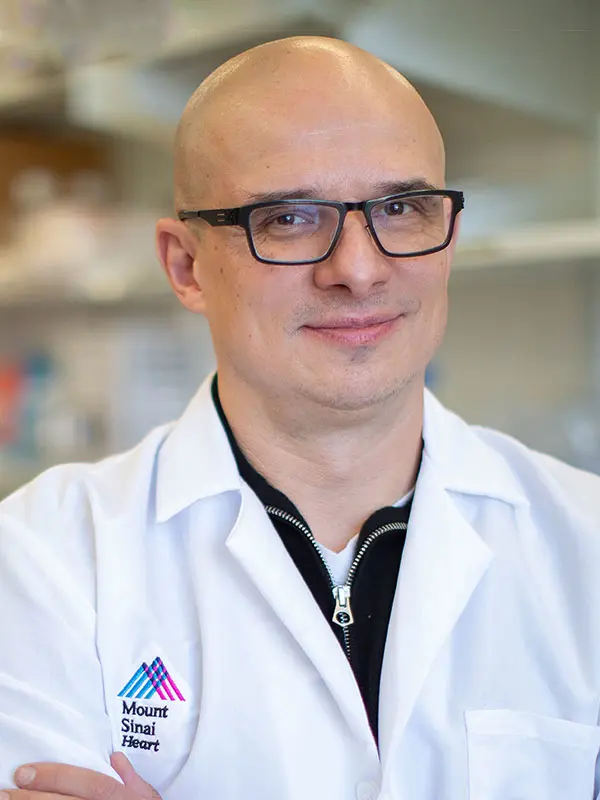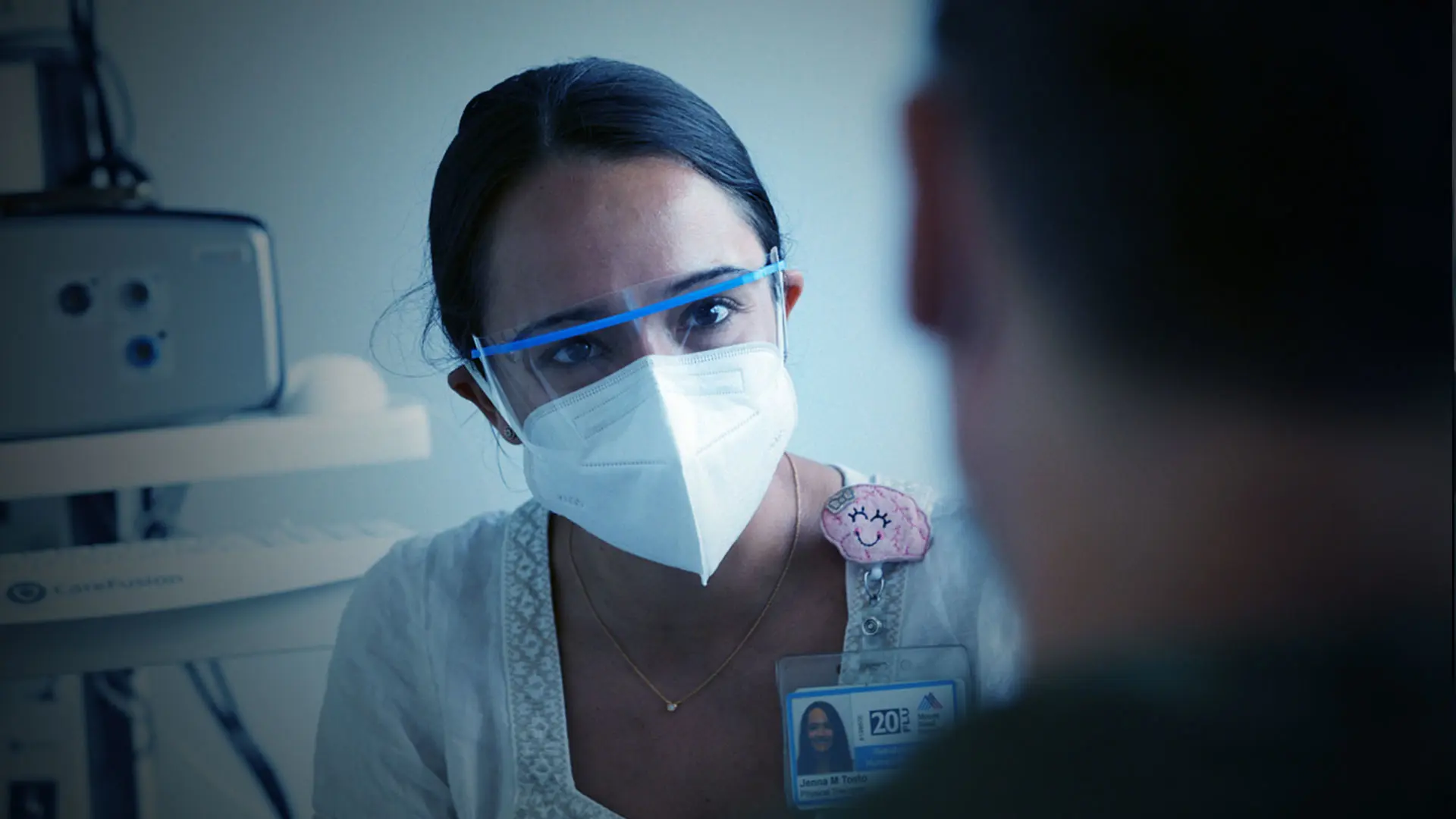As the COVID-19 pandemic enters a third year, thousands of patients who were considered recovered are experiencing residual respiratory and cardiac symptoms. Mount Sinai is taking on this challenge through a nationwide health consortium study funded by the National Institutes of Health (NIH) that will explore the long-term impacts of SARS-CoV-2, the virus that causes COVID-19.
The NIH Researching COVID to Enhance Recovery (RECOVER) Initiative will assess the post-acute sequelae of SARS-CoV-2 infection (PASC). Mount Sinai, which participated in the design of the initiative, will serve as a hub site for two cohort studies as part of it: one involving an autopsy cohort and the other focused on an adult cohort. Alexander Charney, MD, PhD, the lead Principal Investigator at Mount Sinai, says respiratory concerns will be a major focus of this undertaking.
“The goal for the study is to recruit more than 17,000 patients across 15 hub sites, all of which will engage in a standard protocol that assesses the clinical symptomatology across all organ systems following infection and then follow these patients to see what occurs clinically over the long term after infection and how these phenomena are occurring,” explains Dr. Charney, Assistant Professor of Psychiatry, Genetics and Genomic Sciences, Neuroscience, and Neurosurgery at the Icahn School of Medicine at Mount Sinai. “The expectation is that the respiratory is going to be the most impacted of the organ systems and for that reason it will be front and center in this initiative.”
The RECOVER study is not intended to recruit patients who have symptoms. Instead, the objective is to survey the patient population that tested positive for the virus to assess the prevalence of PASC and identify factors that are predictive of these symptoms. Potential research projects could involve an assessment of symptoms and prevalence post-infection against a control group or an exploration of immune markers that are predictive of long-term symptoms.
“There will be multiple assessments conducted from basic clinical to second- and third-tier analysis,” says Zahi Fayad, PhD, Director of the BioMedical Engineering and Imaging Institute, and Professor of Medicine (Cardiology), and Diagnostic, Molecular and Interventional Radiology, at Icahn Mount Sinai. “Through these assessments, we can gain a better understanding of which patients are likely to have persistent symptoms, why they have those symptoms, and the likely implications—such as the potential demand for heart or lung transplantation—for the field of pulmonology specifically and health care in general.”
Looking for factors that may predict long-term COVID-19 symptoms
Some insights as to potential implications can be gleaned from a 2021 Mount Sinai pilot study that evaluated patients who presented with “long COVID” symptoms. The study, conducted by Mount Sinai’s Division of Pulmonary, Critical Care and Sleep Medicine in partnership with the BioMedical Engineering and Imaging Institute, the Division of Cardiology, and the Department of Diagnostic, Molecular and Interventional Radiology, recruited more than 100 patients. They underwent sophisticated imaging such as cardiac magnetic resonance imaging; positron emission tomography imaging using fluorodeoxyglucose to identify traces of inflammation; and computer-assisted tomography (CT) chest scans to assess both residual infiltration and perfusion abnormalities.
“The study participants were mainly outpatients referred through cardiology who had symptoms such as chest pain, shortness of breath, palpitation, and fatigue,” explains Maria Giovanna Trivieri, MD, PhD, Assistant Professor of Medicine (Cardiology), and Diagnostic, Molecular and Interventional Radiology, at Icahn Mount Sinai. “We are still reviewing the data we collected but they suggest that approximately 25-30 percent of patients who contracted COVID-19 have evidence of persistent cardiac involvement and the majority of the patients had abnormal CT lung scans.”
According to Charles Powell, MD, MBA, Chief of the Division of Pulmonary, Critical Care and Sleep Medicine; Director of the Mount Sinai – National Jewish Health Respiratory Institute; and Janice and Coleman Rabin Professor of Pulmonary Medicine at Icahn Mount Sinai, the pilot study imaging is suggestive of disorders at the level of the microvasculature within the lung that characterize not only the acute impact of COVID-19 but also the chronic impact of the virus. “Efforts to address the dysregulation of the microvasculature through a variety of approaches that await subsequent study may offer a benefit to improve symptoms and enhance recovery for patients who have post-acute impacts of COVID-19,” he says.
Recruitment for the RECOVER study began in December 2021 and the goal is to have all participants enrolled within one year. In the meantime, the study’s hub sites have submitted proposals to the NIH outlining their research plans for this patient population. Dr. Charney expects most of the research proposed will focus on implications of long COVID from a pulmonology perspective, given that it is primarily a respiratory illness.
“Much of our understanding of the impacts of COVID-19 is based on anecdotal or patient-driven research, which is valuable, but also contains considerable biases,” he says. “RECOVER is a rigorously designed study that should give us a better indication not just as to the frequency of PASC but also what the impacts are. The more data we gather, the more we can hypothesize and explore potential treatments.”
Featured

Zahi Fayad, PhD
Lucy G. Moses Professor in Medical Imaging and Bioengineering, and Professor of Medicine (Cardiology)

Filip K. Swirski, PhD
Arthur and Janet C. Ross Professor of Medicine (Cardiology); Professor of Diagnostic, Molecular, and Interventional Radiology; Director of The Cardiovascular Research Institute
